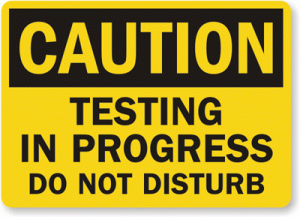It would be much easier to teach the rules for Spanish adjectives use and placement if more of my students knew what an adjective was. Good students keep getting fouled up on assignments and tests by the statement, “Answer the questions in complete sentences.” These kids would happily oblige if they knew what how to build this mystery object, “the complete sentence.” Learning grammar has become one of the hidden benefits of foreign language study.
Teaching grammar is definitely slowing me down, however. I am not complaining. I am happy to fill in this hole in our educational system. I’d be happy to teach some of that missing geography as well. Middle school students should be able to identify more than the majority of U.S. states and their capitols, along with the United States, and sometimes Mexico and Canada.
We are dropping grammar, along with geography, cursive writing, and even sometimes recess in an effort to get more time for English and mathematics. If a subject does not affect school test scores, that subject is likely to vanish or find its class minutes cut in a poorer-scoring school. In better-scoring schools that can still afford to teach away from the test, some subjects may still be deemphasized, but stronger districts have been able to offer more robust and diverse curricula than their less-advantaged counterparts, simply because they have not had to live in fear of the old No Child Left Behind penalties from failing test scores, penalties that only just vanished from the educational landscape.
Eduhonesty: I went to a poor high school in Tacoma, Washington some decades ago. By middle school, I knew grammar. I could find most of the world on the map. I was able to eventually major in mathematics and gain the credits and knowledge needed to become a high school math teacher. In my two long-ago shots at the verbal portion of the GRE, I believe I averaged 97.5%.
I was not alone. My classmates graduated able to write paragraphs. They recognized complete sentences by the age of thirteen because they had been taught the parts of a sentence. They knew the subject and verb were not optional, although the subject, especially in commands, did not always need to be explicitly written out.
It’s scary how many of our students know that something is going on with refugees from somewhere, but can’t explain who these refugees are or why they are leaving their home countries. Some can’t get within 1,000 miles or more of finding Syria on a globe.
Newspapers and other sources spend a great deal of time discussing the total amount of time spent on testing now. America would benefit from more discussion about how testing is determining instructional content. Testing is driving instructional choices. I offer that fact as a major reason why testing needs to be notched back and also changed in character. We ought to start testing for knowledge of the world, as well as the fundamentals of grammar that we are now expecting students to somehow pick up contextually. As schools hone in on English and math, adding more instructional time in these areas, they necessarily take time away from social studies, science and other topics that are not expected to be seen on the test.
That current emphasis on critical thinking? Critical thinking cannot happen without a reasonable store of background knowledge. I find conversations with my middle school students unnerving at times now, because that knowledge seems thin on the ground. I worry when a student hands me a list of activities and asks why that list does not represent a complete sentence. I worry when a student asks where Europe is. I worry when a kid tells me that offering an apple to a teacher is “racist.” I am not sure I mind the question about why we need math. Kids have been asking that question as long as I remember.
In a time when we should be raising global citizens, we have too many kids who can’t write a paragraph or tell the difference between Poland, Syria and Finland.
I don’t see the Common Core helping us with this problem, either. As far as I can tell, the Core has created a new, harder math that is more demanding than the previous math, while showing no signs of being actually better than that previous math, and the Core has shifted our reading choices away from the classics toward more nonfiction. Since I am not sure how the classics were failing us, I don’t see the benefit of this shift. I know our vocabularies will be the poorer for the change.
In the meantime, I’ve spent a long week shushing my classes for the sake of other classes that are taking the PARCC test, and that shushing is not over yet. Because the test is computerized, and because the whole school cannot take a computerized test at once — hardly any school has the bandwidth to do this — I face more weeks of shushing combined with days when students who tested all morning arrive fried in my classroom.
For the sake of my students, I desperately wish I could move educational practice and theory back twenty years or so, before No Child Left Behind and before testing became the goal of education, instead of merely a sensible, measuring tool.


